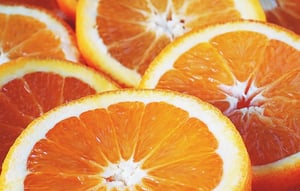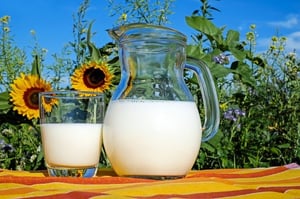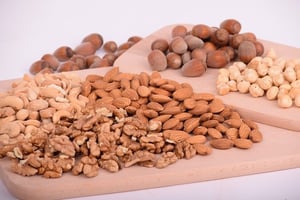Do you find yourself struggling to fit in a workout? If so, you are not alone. It can be hard to...
Make Sure You’re Getting These Vitamins This Winter
With the sun hiding and the temperature dropping, there is no denying the fact that winter has arrived. During this season of the year, your immune system is under a lot of stress and strain.
Nutritious food acts to protect your body from colds and diseases in the winter. To prepare your body for harsh weather, you should include essential vitamins and nutrients in your diet. Increase your consumption of healthy foods such as dry fruits, nuts, root vegetables, and oilseeds, which will keep you warm in the cold.
Vitamins D, C, A, E, and B12 are necessary to maintain a healthy immune system, bones strength, improve heart health, and prevent dry skin. These winter vitamins will improve your mood fluctuations as well.
We've compiled the following list, which includes several critical vitamins that you should ensure you are getting enough of during the winter months to stay healthy:
Vitamin C
 People talk about vitamin C in a way that implies it keeps you healthy and cheerful during the flu and cold season. We're sorry to burst your happy little bubble of immunity; this is not properly explained how vitamin C works.
People talk about vitamin C in a way that implies it keeps you healthy and cheerful during the flu and cold season. We're sorry to burst your happy little bubble of immunity; this is not properly explained how vitamin C works.
Vitamin C will not prevent you from having a cold, but it will help lessen the intensity of a cold. Vitamin C improves the performance of your immune system. The body does not produce vitamin C. Thus, it must be obtained through food such as citrus fruits, cranberries, leafy greens, and bell peppers.
Vitamin C is important for the metabolism of proteins and helps create antibodies that fight off illnesses. In addition, it stimulates the production of collagen, which is necessary for the formation of connective tissues. This water-soluble vitamin, commonly known as Ascorbic acid, protects your immune system by acting as an antioxidant.
Vitamin D
 Vitamin D deficiency is not uncommon. When exposed to sunlight, our bodies produce vitamin D (cholecalciferol). As a result, vitamin D levels in the body may be decreased during the winter months. Vitamin D is required for calcium absorption in the bones. Its deficiency is connected with insomnia, depression, joint pain, a weakened immune system, and it can result in Seasonal Affective Disorder (SAD).
Vitamin D deficiency is not uncommon. When exposed to sunlight, our bodies produce vitamin D (cholecalciferol). As a result, vitamin D levels in the body may be decreased during the winter months. Vitamin D is required for calcium absorption in the bones. Its deficiency is connected with insomnia, depression, joint pain, a weakened immune system, and it can result in Seasonal Affective Disorder (SAD).
The body finds it difficult to compensate for its vitamin D shortage during the winter months. To compensate for your vitamin D deficiency, you should eat vitamin D-rich foods. Egg yolks, oily fish (such as salmon, mackerel, cod, and tuna), fortified milk, beef liver, cereals, avocados, and mushrooms are all examples of these food sources. Vitamin D supplements can also help us overcome this deficit. Vitamin D Strips provide 1000 IU (or 125 percent of the daily intake) of Vitamin D to help relieve symptoms and increase energy.
Vitamin E
 While vitamin E deficiency is rare, it is a crucial component of your health, particularly your skin health. Winter temperatures can make your skin flaky, dry, and itchy. Still, vitamin E-enriched food may help your skin retain moisture, keeping it smooth and strong. It has also been proven to reduce inflammation, redness, and wrinkles.
While vitamin E deficiency is rare, it is a crucial component of your health, particularly your skin health. Winter temperatures can make your skin flaky, dry, and itchy. Still, vitamin E-enriched food may help your skin retain moisture, keeping it smooth and strong. It has also been proven to reduce inflammation, redness, and wrinkles.
Vitamin E is found in a wide variety of foods. In fact, you should be able to obtain enough of it from your diet. Nuts (e.g., almonds, peanuts, etc.), seeds (such as sunflower), and certain oils (like grapeseed or sunflower oil) have the highest vitamin E content per serving. Avocados, spinach, beet greens, and trout are also good sources of vitamin E.
While not a standard supplement, adding vitamin E to your skincare routine has significant advantages. And it's easy to do because this skin-protecting vitamin is found in most lotions. Simply check the ingredients label on the back of your favorite moisturizer bottle. Vitamin E lotions are available in St. Ives, Burt's Bees, Vaseline, and Lubriderm.
Vitamin B12
.jpg?width=300&name=pexels-estudio-gourmet-2959303%20(1).jpg) Cobalamin, or vitamin B12, is a water-soluble vitamin. It is essential for the formation of red blood cells & DNA and the efficient functioning of the nervous system.
Cobalamin, or vitamin B12, is a water-soluble vitamin. It is essential for the formation of red blood cells & DNA and the efficient functioning of the nervous system.
Animal foods, such as meats, fish, poultry, eggs, and dairy, contain vitamin B12. It can, however, be found in B12-fortified foods like some bread kinds and plant-based milk.
B12 insufficiency is unfortunately frequent, especially among older adults. If you don't get much from your meals or do not absorb enough from the food you eat, you're in danger of becoming deficient.
Iron
 Approximately ten million people in the United States are iron deficient, with five million suffering from iron deficiency anemia. This can be troublesome because iron is the mineral that forms hemoglobin.
Approximately ten million people in the United States are iron deficient, with five million suffering from iron deficiency anemia. This can be troublesome because iron is the mineral that forms hemoglobin.
You might be thinking, "Hemo-what?" Hemoglobin is a protein that transports oxygen to your cells. Thus, it's essential. It is well-known for its positive effects on overall vitality, as it plays a key part in the formation of red blood cells. It can also help you regulate your body temperature, which is especially useful this time of year when you're trying to stay warm.
Like other trace elements, iron is not generated in significant quantities by the body, which is why daily dietary consumption is essential. You should talk to your doctor about taking an iron supplement if you're tired, have cold hands and feet, have brittle nails, or have headaches. To get additional iron in the kitchen, cook up some lentils, beans, leafy greens, or red meat. Iron is mainly found in red meats, offal, dry vegetables and is frequently taken in insufficient amounts.
It doesn't matter what season it is. Vitamins and minerals are essential components for overall health and well-being. Vitamins should be obtained through a healthy diet, and supplements should be used to augment that diet. In addition, supplements can aid in maintaining a robust immune system, staying warm, and combating the winter blues. If you're facing any inadequacies, discuss with your doctor, and determine the correct dosage for you.
Let us know in the comments below - In the winter months, how do you keep your health afloat?






